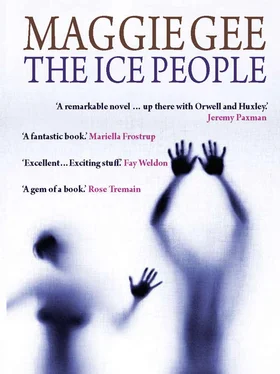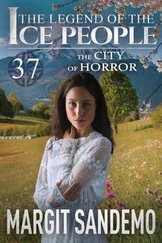Maggie Gee - The Ice People
Здесь есть возможность читать онлайн «Maggie Gee - The Ice People» весь текст электронной книги совершенно бесплатно (целиком полную версию без сокращений). В некоторых случаях можно слушать аудио, скачать через торрент в формате fb2 и присутствует краткое содержание. Год выпуска: 2008, Издательство: Telegram Books, Жанр: Фантастика и фэнтези, на английском языке. Описание произведения, (предисловие) а так же отзывы посетителей доступны на портале библиотеки ЛибКат.
- Название:The Ice People
- Автор:
- Издательство:Telegram Books
- Жанр:
- Год:2008
- ISBN:нет данных
- Рейтинг книги:4 / 5. Голосов: 1
-
Избранное:Добавить в избранное
- Отзывы:
-
Ваша оценка:
- 80
- 1
- 2
- 3
- 4
- 5
The Ice People: краткое содержание, описание и аннотация
Предлагаем к чтению аннотацию, описание, краткое содержание или предисловие (зависит от того, что написал сам автор книги «The Ice People»). Если вы не нашли необходимую информацию о книге — напишите в комментариях, мы постараемся отыскать её.
imagines an ice age enveloping the Northern Hemisphere. It is Africa’s relative warmth that offers a last hope to northerly survivors. As relationships between men and women break down, the novel charts one man’s struggle to save his alienated son and bring him to the south and to salvation.
Maggie Gee
The White Family
The Flood
The Ice People — читать онлайн бесплатно полную книгу (весь текст) целиком
Ниже представлен текст книги, разбитый по страницам. Система сохранения места последней прочитанной страницы, позволяет с удобством читать онлайн бесплатно книгу «The Ice People», без необходимости каждый раз заново искать на чём Вы остановились. Поставьте закладку, и сможете в любой момент перейти на страницу, на которой закончили чтение.
Интервал:
Закладка:
— It was pitch dark, my son was driving, it felt as if we were inching down a cliff edge that at any moment might disappear. The road turned blind bends without any warning, and as we slowed the snow got worse, coming straight for our headlights, a field of stars streaming thickly towards us out of the blackness. I was hypnotised. I stared at the stars. They were the point, they were infinitely many … Then I jerked awake as the brakes squealed.
Poor Luke. How did he manage to drive at all, having just watched Briony get shot to pieces, with me alongside him dozing and drifting and yelling ‘Watch out!’ whenever I woke?
I was running, remember, on massive shock, two sleepless nights, too much alcohol, and several unattended wounds. My head was bleeding, a low warm seep down the side of my neck that I ignored, thinking my last night’s wound had opened, but by the grey light of early morning I found that one of their bullets had winged me.
I remember morning in the mountains. The morning after, or several days later? Yellow, leaden, the snow pouring endlessly out of the bottomless pit of the sky, and visibility so low that although we knew that to the right of the road the land must stretch down to the plains of Ebro, all we could see was snow and mist, mist and snow, swirling, blowing, and Briony was dead, it couldn’t be changed, and the car felt queerly unbalanced and empty.
Then the mist for a moment suddenly parted and I saw a minute village laid out at our feet, a midget church, three tiny houses, and it seemed that nothing on earth could stop us plunging over and crashing downwards.
I was not myself. Quite how bad I was I didn’t realise till I woke up and Luke had laid me out on the seat of the car, with my head on a blanket, too stiff to move. When I gingerly felt my temple I found that he had bandaged it, and put a Coolsafe skinpatch on. It was dark again. How many nights?
My head had cleared, or so I thought. We were parked in the ruins of some sheltering building. There was a fire. He must have lit it himself. He was sitting in the front seat, mumbling to Dora. No, he was playing chess with her. She was an excellent player, but predictable. I knew there were things I had to tell him.
‘Luke —’
‘You’re awake! I just changed your bandages.’
‘About Briony.’
‘No,’ he said. ‘I don’t want to talk about Briony.’
‘It’s your move,’ said Dora, brightly.
I ignored the creature. I had to explain. ‘She begged me to leave. She was thinking of you —’
‘It’s not my fault,’ Luke interrupted. His voice was shaking, furious. ‘Don’t blame it on me. You grabbed the wheel, you went and left her —’ I knew he was trying not to cry. ‘Don’t ever say it was because of me.’
‘It’s your move,’ Dora said again.
I think Luke would have liked to punch me. Adolescent boys often fight their fathers. But we couldn’t brawl, all we had was each other, and we were alone in the Pyrenean night.
‘I’ll get some air,’ I said to him. I pulled on my boots, which seemed to take forever, and heaved my body out of the car. We were in some kind of ruined chapel, which gave us shelter from the icy wind. I dragged my blankets near the fire and closed my eyes, too tired to argue. Coolsafe is also a sedative. A dog was barking; I ignored it. I tried to think of the future, not the past, the red plains of Spain, the greygreen olives, the distant whiteness of the coast, the sea that divided us from Africa, such a little sea, and beyond it, safety … Safety for Luke, where the ice would not come.
I told myself it was all for him. I had even sacrificed Briony — I held on to the thought it was somehow heroic.
(I had to think that when the flashbacks came, repeated flashbacks of my last sight of her, jerking like a puppet, turning, calling — and that sudden vile explosion of matter from the side of her head, her small brave face.)
But now, when I am so much older and colder, I see I wasn’t a hero, or a villain, or any of the things they say in stories — but merely one tiny unit of biology, stopping at nothing to save his genes.
These were the attitudes we struck, as the ice crept on towards our feet. We dreamed apocalyptic dreams. We fled our terror of the cold. We thought of the ice as waste, dead, a barren zone where life was extinguished –
But gradually I began to see the truth. We were the exceptions to the rule. The ice was bad for human beings, shattered our careful webs of control, killed our parasites, bugs and bedmates — and yet, the rest of life was flourishing.
Lovelock had said it decades ago. There were more species in ice ages, not fewer. Add on the sideeffects of human decline …
When the cat’s away, the mice will play. We’d been eating lunch one day in France, in a nondescript wood by the side of the road, when I realised I was hearing birdsong. I hadn’t done that since I was a child. The French must have been too busy escaping to bake their songbirds in a pie.
But it wasn’t just birds who were corning back. There were other species, not all of them friendly.
I think Luke shouted from the car window. I started awake. ‘Dad, is that a dog? … It couldn’t be a lion?’ Row, row, row. That bark again, closer this time. Did he really ask if it was a lion? Luke had seen so few animals. In Britain we had eradicated dogs, the bird populations had shrunk to nothing after two great fires in pesticide plants, and the zoos had all been closed by law. Luke’s generation had never heard lions.
‘No, not a lion — go to sleep.’
All over Euro, according to the screens, there were packs of wild dogs, rabid, halfstarving, who terrorised people on the edge of the towns. But we were not on the edge of a town. I fell asleep, thinking of childhood, when there were dogs in England too, and they were seen as faithful friends … We had a dog, a cocker spaniel, with crooked, silky ears and tail, Sally, she was called, panting, adoring, before rabies came through the Channel Tunnel and the whole dog population was destroyed. Thousands of people thronged Whitehall and pelted the politicians with dogshit, but it was too late to save my Sal.
She was barking, desperately, in my dream, because they were taking her away to the vet’s, and although I had secretly planned to save her, when it came to the moment, the only one that counts, I knew it was hopeless, and did nothing, I turned away and let her die, and now she howled and howled in my ear …
I woke in an instant. The howling was real. I tried to sit up, and something ran in to the ruins, by the glow of the fire, then another, and another, and I smelled them, too, a wild, rank smell, and their shape was strange, like queer thin huskies …
Then I saw, as one ran past the fire, it had bloody bandages in its mouth, the bandages Luke had taken off me, and in the same instant, on a surge of fear, I realised they weren’t dogs but wolves, or hybrids, perhaps, of dogs and wolves. I saw one’s fangs, its heavy tail, the narrow chest and crippled hips, and from its terrible thinness, that they were starving.
I staggered to my feet, throwing off my blankets, and felt a puncturing bite in the meat of my thigh — Surely I was dreaming, but my leg felt wet. I made for the fire, I’d read that wolves were afraid of fire, and the buggers ran at me again, three or four of them this time, harrying me, the firelight catching damp tongues and teeth, and the smell was disgusting, overpowering, they smelled of urine and blood and bad breath, and at the last moment I grabbed some straw and as it flared into a great untidy bundle of flame I pushed it at them. They howled and ran! I grew bolder and pursued them, roaring and yelling, and quickly as they’d come they ran out again.
Читать дальшеИнтервал:
Закладка:
Похожие книги на «The Ice People»
Представляем Вашему вниманию похожие книги на «The Ice People» списком для выбора. Мы отобрали схожую по названию и смыслу литературу в надежде предоставить читателям больше вариантов отыскать новые, интересные, ещё непрочитанные произведения.
Обсуждение, отзывы о книге «The Ice People» и просто собственные мнения читателей. Оставьте ваши комментарии, напишите, что Вы думаете о произведении, его смысле или главных героях. Укажите что конкретно понравилось, а что нет, и почему Вы так считаете.












